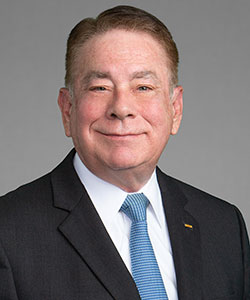How My Military Service Makes Me a Better Mediator
Veterans Day has always held a special significance in my family, where military service is a long-standing tradition.
For four generations, we’ve put on a uniform to protect our country. The call of duty sent my father into World War II, my father-in-law into the Korean War and my brother and me into the Vietnam War. The tradition continues today, with my son serving as a reserve naval intelligence officer.
I’m often asked: Why is the pull to service so strong in my family? For one, we are patriots. We love our country. There’s an emotional connection we feel every time our flag is raised or our anthem is sung.
But there’s also always been an intellectual underpinning to my service. I believe that the United States has been the greatest engine for justice and prosperity ever assembled in the history of the world. Yes, we have serious problems—we always have. But we have so much to be grateful for, and to me, our country is worth defending.
I believed so much in paying a debt owed to my country that after my active-duty military service in Vietnam ended, I joined the National Guard in Houston. As a 30-year-old practicing lawyer at the time, I probably should have thought twice about going to airborne school to train as a paratrooper. But I survived four years as a ranger in a reconnaissance unit. I later spent 12 years in the Judge Advocate General’s Corps.
No doubt, throughout my 20 years of service, I made personal sacrifices. But I also gained so much from the experience. In my work today as a mediator, that experience helps in two principal ways.
Number one, I learned to work and communicate with people from all walks of life. In the military, you don’t get to choose your fellow soldiers. You are thrown together with people who don’t look like you, talk like you or think like you. But you do have to learn to trust them and inspire them to trust you.
To a mediator, trust is the coin of the realm. If you can’t get parties to trust you as a fair neutral, you won’t be successful. Obtaining that trust requires a high level of empathy. You have to want to learn about everyone’s passions and viewpoints. For example, I learned in the military that not everyone is a gifted communicator. But to ensure cohesiveness in a unit, it’s crucial to listen. That’s true with mediation as well. To get full buy-in on the process, I have to make every party feel comfortable and heard.
Number two, my military experience taught me to focus on the mission. As a sergeant and as an officer, I learned that every action we took as a unit needed to help us accomplish our mission.
In mediation, the mission is to settle a dispute. That often means convincing adversaries that they’re better off settling than proceeding down the road where the outcome is unknown. It’s not always an easy sell. So many parties I encounter are emotionally attached to their positions. They cling to their favorite arguments and pieces of evidence and lose sight of the goal of the mediation.
Recently, I was mediating a dispute between two large companies. As we entered the final negotiation phase, $50,000 separated them. One side dug in and refused to budge. Their objection was rooted in principle, they told me.
In my experience, when parties invoke “principles,” they’re often heading down a rabbit hole, traveling further from the mission of settling their dispute. I explained that if they wanted to abandon the effort to settle and litigate the case, they’d have to spend a multiple of the $50,000 on high-quality lawyers, and they still would not be guaranteed success. In the end, they agreed and settled the dispute.
I’ve found that mediation is a natural extension of my military service. I’m no longer defending my country in combat, but I’m helping people resolve disputes, which I see as a form of public service. On this Veterans Day, I can clearly see how my past service informs my present mission.
Disclaimer:
This page is for general information purposes. JAMS makes no representations or warranties regarding its accuracy or completeness. Interested persons should conduct their own research regarding information on this website before deciding to use JAMS, including investigation and research of JAMS neutrals. See More

